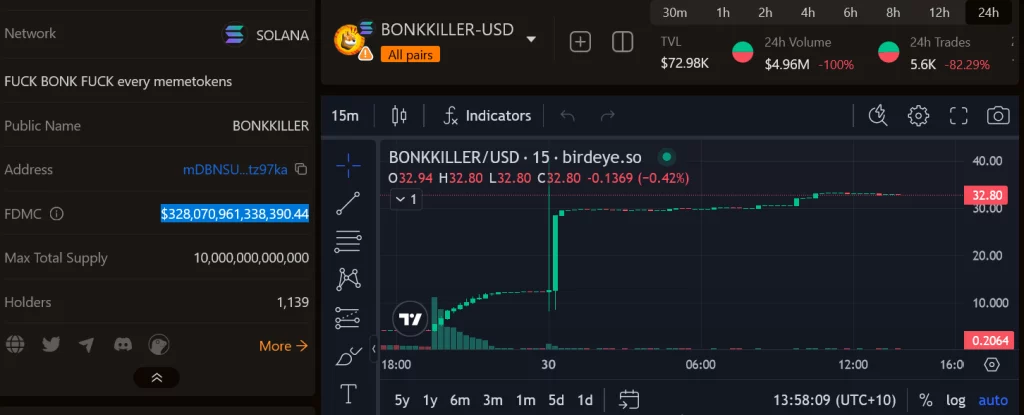An obscure Solana-based memecoin, with just over 1,000 holders, has surged to a staggering market cap of $328 trillion, making it seemingly the most valuable asset globally. However, the catch is that it’s a honeypot scam, rendering it impossible for anyone to sell their holdings.
This memecoin, named BONKKILLER, was launched on April 29 and has seen trading volume of around $4.6 million in the past 24 hours. According to Birdeye, over 90% of the tokens are owned by the creator.
The unfortunate reality for investors is that they’re unable to move or sell any of their holdings due to the developer’s implementation of a “freeze authority,” which gives them the power to halt token transfers.
Solana-focused news platform SolanaFloor highlighted the situation, labeling BONKKILLER as a scam and honeypot token, noting its inflated market cap following the developer’s action to freeze token holders’ accounts and prevent sales.

A honeypot is a type of scam that lures investors with high-profit potential but prevents them from selling.
For perspective, $328 trillion is 3.28 times more than the entire global domestic gross product, which sits at $100 trillion, according to Worldometer.
Nonfungible token enthusiast “thirt13n” was among those who pointed out the memecoin isn’t actually backed by that much fiat and the marketcap metric is useless if tokenholders cannot sell.
“Bullshit metrics. if you are unable to sell, its worth $0.”
Despite several platforms notifying investors of the honeypot scam, traders continue to buy BONKKILLER tokens, Birdeye data shows.

The creator has also pulled $1.62 million in funds from victims across 11 transactions, per on-chain data.
BONKKILLER is just the latest example of a memecoin rug pull or honeypot scam tricking gullible users.
An investigation by Cointelegraph Magazine found one in six memecoins on the Ethereum layer two scaling solution Base are scams, or have characteristics as such, and that 91% of the memecoins analysis possessed at least one security vulnerability.

However, they could also reflect a creator’s lack of knowledge about proper security procedures, especially if they’ve launched a token as a joke or to troll the industry.
Blockchain scam prevention tools have been developed to detect potential honeypots by performing smart contract and token analysis in real-time.

